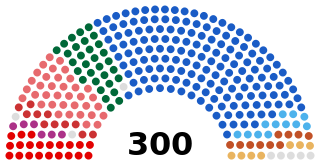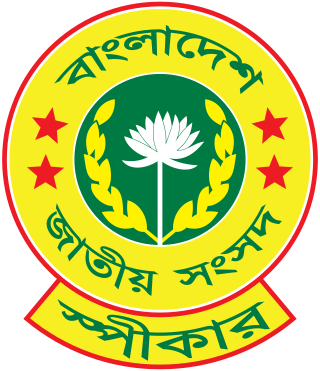Related Research Articles

The Parliament of the United Kingdom of Great Britain and Northern Ireland is the supreme legislative body of the United Kingdom, and may also legislate for the Crown Dependencies and the British Overseas Territories. It meets at the Palace of Westminster in London. Parliament possesses legislative supremacy and thereby holds ultimate power over all other political bodies in the United Kingdom and the Overseas Territories. While Parliament is bicameral, it has three parts: the sovereign, the House of Lords, and the House of Commons. The three parts acting together to legislate may be described as the King-in-Parliament. The Crown normally acts on the advice of the prime minister, and the powers of the House of Lords are limited to only delaying legislation.
A question time in a parliament occurs when members of the parliament ask questions of government ministers, which they are obliged to answer. It usually occurs daily while parliament is sitting, though it can be cancelled in exceptional circumstances. Question time originated in the Westminster system of the United Kingdom, and occurs in other countries, mostly Commonwealth countries, who use the system.

The Parliament of Finland is the unicameral and supreme legislature of Finland, founded on 9 May 1906. In accordance with the Constitution of Finland, sovereignty belongs to the people, and that power is vested in the Parliament. The Parliament consists of 200 members, 199 of whom are elected every four years from 13 multi-member districts electing 6 to 37 members using the proportional D'Hondt method. In addition, there is one member from Åland.

A speech from the throne, or throne speech, is an event in certain monarchies in which the reigning sovereign, or their representative, reads a prepared speech to members of the nation's legislature when a session is opened. The address sets forth the government's priorities for its legislative agenda, for which the cooperation of the legislature is sought. The speech is often accompanied by formal ceremony. It is often held annually, although in some places it may occur more or less frequently, whenever a new session of the legislature is opened.

The New Zealand Parliament is the unicameral legislature of New Zealand, consisting of the Sovereign (King-in-Parliament) and the New Zealand House of Representatives. The King is usually represented by his governor-general. Before 1951, there was an upper chamber, the New Zealand Legislative Council. The New Zealand Parliament was established in 1854 and is one of the oldest continuously functioning legislatures in the world. It has met in Wellington, the capital of New Zealand, since 1865 and in its current building since 1922.

The Parliament of the Democratic Socialist Republic of Sri Lanka is the supreme legislative body of Sri Lanka. It alone possesses legislative supremacy and thereby ultimate power over all other political bodies in the island. It is modeled after the British Parliament. The 16th Parliament of Sri Lanka was dissolved on 24 September 2024.
Parliamentary privilege is a legal immunity enjoyed by members of certain legislatures, in which legislators are granted protection against civil or criminal liability for actions done or statements made in the course of their legislative duties. It is common in countries whose constitutions are based on the Westminster system.

The National Assembly of Pakistan is the lower house of the bicameral Parliament of Pakistan, with the upper house being the Senate. As of 2023, the National Assembly has a maximum membership of 336, of which 266 are directly elected by an adult universal suffrage and a first-past-the-post system to represent their respective constituencies, while 60 are elected on reserved seats for women and religious minorities from all over the country. Members hold their seats for five years or until the house is dissolved by the President on the advice of the Prime Minister. The house convenes at the Parliament House, Red Zone, Islamabad.

The Parliament of Pakistan is the supreme legislative body of the Islamic Republic of Pakistan. It is a bicameral federal legislature, composed of the President of Pakistan and two houses: the Senate and the National Assembly. The president, as head of the legislature, has the power to summon or prorogue either house of the Parliament. The president can dissolve the National Assembly, only on the Prime Minister's advice.

The Parliament of the Hellenes, commonly known as the Hellenic Parliament, is the unicameral legislature of Greece, located in the Old Royal Palace, overlooking Syntagma Square in Athens. The parliament is the supreme democratic institution that represents the citizens through an elected body of Members of Parliament (MPs).

The People's Majlis is the unicameral legislative body of Maldives. It has the authority to enact, amend and revise laws, as outlined in the Constitution of the Maldives. It is composed of 93 members as of 2024.

The Parliament of Antigua and Barbuda consists of the King of Antigua and Barbuda, the Senate and the House of Representatives.

The Chamber of Representatives is one of the two chambers in the bicameral Federal Parliament of Belgium, the other being the Senate. It is considered to be the "lower house" of the Federal Parliament.

The prime minister of Cambodia is the head of government of Cambodia. The prime minister is also the chairman of the Cabinet and leads the executive branch of the Royal Government of Cambodia. The prime minister is a member of parliament, and is appointed by the monarch for a term of five years. Since 1945, 37 individuals have served as prime minister; 33 as official prime ministers, and 4 in acting capacities. The current prime minister since 2023 is Hun Manet.

The Federal Parliamentary Assembly is the federal legislature of Ethiopia. It consists of two chambers:

The Senate of Kazakhstan is the upper house of two chambers in Kazakhstan's legislature, known as the Parliament (Parlamenti). The Senate is composed of elected members: two from each region and two from three municipalities which are Almaty, Astana, and Shymkent.

Prinsjesdag is the day on which the reigning monarch of the Netherlands addresses a joint session of the States-General of the Netherlands to give the Speech from the Throne, similar to the annual State of the Union in the United States or the British State Opening of Parliament. This speech sets out the main features of government policy for the coming parliamentary session.

The Speaker of the Parliament of the Democratic Socialist Republic of Sri Lanka is the presiding officer of the chamber. The Speaker fulfills a number of important functions in relation to the operation of the House, which is based upon the British Westminster parliamentary system. The speaker is second in the Sri Lankan presidential line of succession, after the prime minister.

The Speaker of the Jatiya Sangsad is the presiding officer of the Parliament of Bangladesh. The speaker is elected generally in the first meeting of the parliament following general elections by Members of Parliament. Serving for a term of five years, the speaker chosen from sitting members of the parliament, and is by convention a member of the ruling party or alliance.
The Government of the Ethiopian Empire was historically based on the framework of absolute monarchy with a feudal system, where religious legitimacy and the wealthier class were generally prone to priority. Societies were characterized by social inequality and opportunities for social mobility through military performance. There are famines, droughts and illegitimate land acquisition from peasants and landowners.
References
- ↑ SudanTribune (2006-11-01). "The unproductive parliament of Ethiopia". Sudan Tribune. Retrieved 2024-11-06.
- ↑ "Constitutional & Parliamentary Information" (PDF). Retrieved 6 November 2024.
- 1 2 3 4 5 6 "Parliament in Ethiopia; Participation, Representation and Resistance" (PDF). pp. 110–111. Retrieved 6 November 2024.
- ↑ "Executive Relations in the Ethiopian Parliamentary System" (PDF).
This article needs additional or more specific categories .(November 2024) |